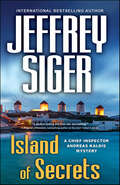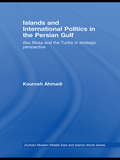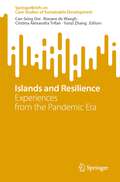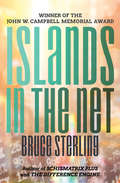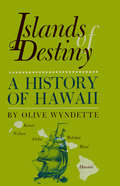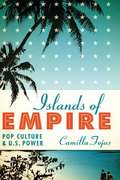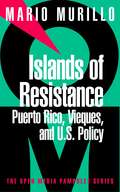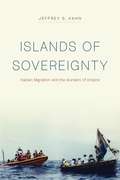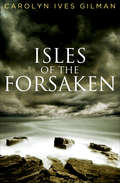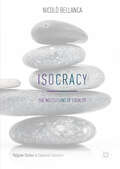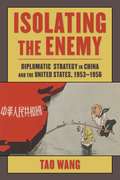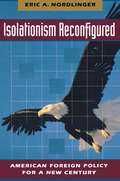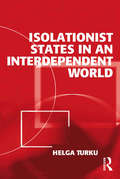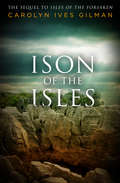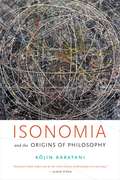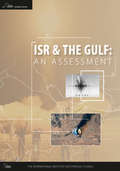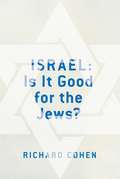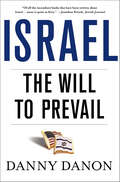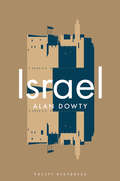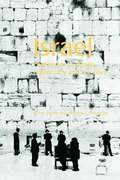- Table View
- List View
Island of Secrets (Chief Inspector Andreas Kaldis Mysteries #10)
by Jeffrey SigerIn September of 1740, singer Tito Amato receives a curious invitation. The German composer Karl Johann Weber is rehearsing a new opera at an isolated villa nestled in the hills of the Venetian mainland. Would Tito accept the lead role? Puzzled by the air of secrecy that enshrouds the production, but attracted by a generous fee, Tito agrees. Artist Gussie Rumbolt, Tito's friend and brother-in-law, has also been summoned to paint scenes of the estate's grape harvest. The two men find the countryside awash with the golden hues of autumn, but the bucolic mood quickly turns menacing when a notorious figure from Tito's past turns up at the villa.That night, at the stroke of twelve, a soprano stumbles over a stranger who has been beaten to death with the clock pendulum. With the local constable away on a boar hunt, the midnight murderer strikes with impunity, raising terror to a fevered crescendo. Ever faithful to the ideals of truth and justice, Tito pursues his own quest for answers—a quest that leads straight into the painful secrets of his heart and beyond. The Iron Tongue of Midnight is the fourth novel in Myers' Baroque Mystery series. It follows Cruel Music.
Island of Shame: The Secret History of the U.S. Military Base on Diego Garcia
by David VineThe American military base on the island of Diego Garcia is one of the most strategically important and secretive U.S. military installations outside the United States. Located near the remote center of the Indian Ocean and accessible only by military transport, the little-known base has been instrumental in American military operations from the Cold War to the war on terror and may house a top-secret CIA prison where terror suspects are interrogated and tortured. But Diego Garcia harbors another dirty secret, one that has been kept from most of the world--until now. Island of Shame is the first major book to reveal the shocking truth of how the United States conspired with Britain to forcibly expel Diego Garcia's indigenous people--the Chagossians--and deport them to slums in Mauritius and the Seychelles, where most live in dire poverty to this day. Drawing on interviews with Washington insiders, military strategists, and exiled islanders, as well as hundreds of declassified documents, David Vine exposes the secret history of Diego Garcia. He chronicles the Chagossians' dramatic, unfolding story as they struggle to survive in exile and fight to return to their homeland. Tracing U.S. foreign policy from the Cold War to the war on terror, Vine shows how the United States has forged a new and pervasive kind of empire that is quietly dominating the planet with hundreds of overseas military bases. Island of Shame is an unforgettable exposé of the human costs of empire and a must-read for anyone concerned about U.S. foreign policy and its consequences. The author will donate all royalties from the sale of this book to the Chagossians.
Islanded: Britain, Sri Lanka, and the Bounds of an Indian Ocean Colony
by Sujit SivasundaramHow did the British come to conquer South Asia in the late eighteenth and early nineteenth centuries? Answers to this question usually start in northern India, neglecting the dramatic events that marked BritainOCOs contemporaneous subjugation of the island of Sri Lanka. In "Islanded," Sujit Sivasundaram reconsiders the arrival of British rule in South Asia as a dynamic and unfinished process of territorialization and state building, revealing that the British colonial project was framed by the islandOCOs traditions and maritime placement and built in part on the model they provided. aUsing palm-leaf manuscripts from Sri Lanka to read the official colonial archive, Sivasundaram tells the story of two sets of islanders in combat and collaboration. He explores how the British organized the process of OC islandingOCO: they aimed to create a separable unit of colonial governance and trade in keeping with conceptions of ethnology, culture, and geography. But rather than serving as a radical rupture, he reveals, islanding recycled traditions the British learned from Kandy, a kingdom in the Sri Lankan highlands whose customsOCofrom strategies of war to views of natureOCofascinated the British. Picking up a range of unusual themes, from migration, orientalism, and ethnography to botany, medicine, and education, "Islanded "is an engaging retelling of the advent of British rule.
Islands and International Politics in the Persian Gulf: The Abu Musa and Tunbs in Strategic Context (Durham Modern Middle East and Islamic World Series)
by Kourosh AhmadiThe position of the Persian Gulf as the main highway between East and West has long given this region special significance both within the Middle East and in global affairs more generally. This book examines the history of international relations in the Gulf since the 1820s as great powers such as Britain and the US, and regional powers such as Iran and Iraq, vied for supremacy over this geopolitically vital region. It focuses on the struggle for control over the islands of the Gulf, in particular the three islands of Abu Musa, Greater Tunb and Lesser Tunb – an issue that remains highly contentious today. It describes how for 170 years Britain eroded Iranian influence in the Gulf, both directly by asserting colonial rule over Iranian islands and port districts, and also through claiming Iranian islands for their protégés on the Arab littoral. It shows how, after Britain's withdrawal, these islands became a pawn in the animosity and conflict that pitted, at one time, Arab radicals and nationalists against monarchical Iran, and, later, the conservative-moderate Arab camp against Islamic Iran. It goes on to explore the impact of the rise of American power in the Gulf since the start of the 1990s, its policy of containment of Iran and Iraq, and how this has provided encouragement to the ambitions of the Persian Gulf Arab littoral states, especially the UAE, towards the islands of the Gulf.
Islands and Resilience: Experiences from the Pandemic Era (SpringerBriefs on Case Studies of Sustainable Development)
by Can-Seng Ooi Roxane De Waegh Cristina Alexandra Trifan Yunzi ZhangThis book explores island resilience and how island communities come together to achieve wellbeing, have agency over their future and resist ongoing neo-colonialism during disruptive events such as COVID-19 and the increasing threats of climate change. This collection provides examples of lived experiences and the responses of island communities, many of them based in tourism-reliant locations. These examples are based on intensive research by a team of diverse academics and practitioners. The chapters offer case studies that interrogate theories related to resilience, wellbeing and social inclusion and provide cutting-edge insights that demonstrate the multifaceted complexity of island resilience.This book examines the islands, their developing economy and social development themes. It is relevant for academic researchers, students, and practitioners interested in the multiple components that contribute to the resilience of island communities, including community development, economic development, tourism, disaster response, community wellbeing, social justice, globalisation, decolonisation, and neoliberal governance in island communities. As many of the island economies examined are also developing island-states, this volume is also essential to scholars investigating economies in transition. The collection is truly interdisciplinary and offers state-of-the-art knowledge on island communities and their resilience.
Islands in the Net
by Bruce SterlingIn a near-future new age of corporate control, hacker mercenaries, and electronic terrorism, a public relations executive on the rise finds herself caught in the violent epicenter of a data war Two decades into the twenty-first century, the world's nations are becoming irrelevant. Corporations are the true global powers, with information the most valuable currency, while the smaller island nations have become sanctuaries for data pirates and terrorists. A globe-trotting PR executive for the large corporate economic democracy Rizome Industries Group, Laura Webster is present when a foreign representative is assassinated on Rizome soil during a conference for offshore data havens. Dispatched immediately on an international mission of diplomacy, Laura hopes she can make a difference in a volatile, unsteady world, but instead finds herself trapped on the front lines of rapidly escalating third-world hostilities and caught up in an inescapable net of conspiracy, terrorism, post-millennial voodoo, and electronic warfare. During the 1980s, science fiction luminary Bruce Sterling envisioned the future . . . and hit it almost dead-on. The author who, along with William Gibson, Neal Stephenson, and Rudy Rucker, helped create and define the cyberpunk subgenre imagines a world of tomorrow in Islands in the Net that bears a striking--and disturbing--resemblance to our present-day information-age reality. Nominated for the Hugo and Locus Awards and winner of the John W. Campbell Memorial Award, Sterling's extraordinary novel is a gripping, eye-opening, and remarkably prescient science fiction classic.
Islands of Destiny: A History of Hawaii
by Olive WyndetteIt is the fast-moving narrative of an island nation whose settlement antedates the arrival of European pioneers by a thousand years, and whose destiny it was to become the fiftieth star in the flag of the United States of America.<P><P> It tells how the Islanders have created a modern-day miracle through education, economic progress, and financial growth in the past 150 years.Olive Wyndette became fascinated by personal contacts with the native Hawaiians during her residence in Honolulu and, as a result, planned this book on the living history of Hawaii.The little-known but dramatic story of the prehistoric period is told in the Prologue. The ensuring text tells how Captain James Cook discovers the Islands, naming them after the Earl of Sandwich. Kamehameha I (the Conqueror) rises to power and unifies the islands through a series of bloody, inter-Island wars. The New England missionaries arrive and are eventually permitted to build the Islands' first Christian church. Following the establishment of a constitutional government, the Islands become the coveted prize of powerful European nations. Finally, annexation of the Islands to the United States is realized in 1898. The Epilogue covers the developments of the twentieth century.
Islands of Empire: Pop Culture and U.S. Power
by Camilla FojasCamilla Fojas explores a broad range of popular culture media-film, television, journalism, advertisements, travel writing, and literature-with an eye toward how the United States as an empire imagined its own military and economic projects. Impressive in its scope, Islands of Empire looks to Cuba, Guam, Hawai'i, Puerto Rico, and the Philippines, asking how popular narratives about these island outposts expressed the attitudes of the continent throughout the twentieth century. Through deep textual readings of Bataan, Victory at Sea, They Were Expendable, and Back to Bataan (Philippines); No Man Is an Island and Max Havoc: Curse of the Dragon (Guam); Cuba, Havana, and Dirty Dancing: Havana Nights (Cuba); Blue Hawaii, Gidget Goes Hawaiian, and Paradise, Hawaiian Style (Hawai'i); and West Side Story, Fame, and El Cantante (Puerto Rico), Fojas demonstrates how popular texts are inseparable from U. S. imperialist ideology. Drawing on an impressive array of archival evidence to provide historical context, Islands of Empire reveals the role of popular culture in creating and maintaining U. S. imperialism. Fojas's textual readings deftly move from location to location, exploring each island's relationship to the United States and its complementary role in popular culture. Tracing each outpost's varied and even contradictory political status, Fojas demonstrates that these works of popular culture mirror each location's shifting alignment to the U. S. empire, from coveted object to possession to enemy state.
Islands of Resistance: Puerto Rico, Vieques, and U.S. Policy (Open Media Series)
by Mario MurilloWhile 1998 marked the 100th anniversary of the United States' invasion and takeover of Puerto Rico, it wasn't until 1999 that the island's political movements reappeared on the radar screen of the American people. That year, two major developments occurred that transformed the relationship between Puerto Rico and Washington, D.C.: the limited clemency granted by then-President Clinton to eleven Puerto Rican Nationalists, and the death of Puerto Rican civilian security guard David Sanes, killed by missile fragments from U.S. naval bombing tests on the island municipality of Vieques.How does Vieques fit into the political future of Puerto Rico? While anti-Navy protesters are careful not to mix the island's political status options with their battle against the Navy, it is important to understand the role Washington has played in shaping Puerto Rico's current reality and how it has allowed the Navy to use Vieques as a bombing range for 60 years. It also helps one begin to predict what is the future of Puerto Rico. Is it to be a colony? Fifty-first state of the United States? Sovereign nation?In Islands of Resistance, Mario A. Murillo approaches these questions by examining how Puerto Rican politics have been shaped as much by 100 years of U.S. economic, military, and cultural domination of the territory, as by the enduring grassroots resistance of the Puerto Rican people. Islands of Resistance puts the contemporary situation in Puerto Rico into an historic context that will help people understand what is at stake in Vieques, not only for Viequenses, but for Puerto Ricans, both on the island and in the diaspora.
Islands of Sovereignty: Haitian Migration and the Borders of Empire (Chicago Series in Law and Society)
by Jeffrey S. KahnIn Islands of Sovereignty, anthropologist and legal scholar Jeffrey S. Kahn offers a new interpretation of the transformation of US borders during the late twentieth century and its implications for our understanding of the nation-state as a legal and political form. Kahn takes us on a voyage into the immigration tribunals of South Florida, the Coast Guard vessels patrolling the northern Caribbean, and the camps of Guantánamo Bay—once the world’s largest US-operated migrant detention facility—to explore how litigation concerning the fate of Haitian asylum seekers gave birth to a novel paradigm of offshore oceanic migration policing. Combining ethnography—in Haiti, at Guantánamo, and alongside US migration patrols in the Caribbean—with in-depth archival research, Kahn expounds a nuanced theory of liberal empire’s dynamic tensions and its racialized geographies of securitization. An innovative historical anthropology of the modern legal imagination, Islands of Sovereignty forces us to reconsider the significance of the rise of the current US immigration border and its relation to broader shifts in the legal infrastructure of contemporary nation-states across the globe.
Isles of the Forsaken (Isles of the Forsaken #1)
by Carolyn Ives GilmanThe Forsaken Isles are on the brink of revolution. Three individuals are about to push it over the edge—in this novel by a three-time Nebula Award nominee. Spaeth Dobrin is destined to life as a ritual healer—but as the dhotamar of the tiny, isolated island of Yora, she will be caught in a perpetual bond between herself and the people she has cured. Is it slavery, or is it love? Meanwhile, Harg, the troubled and rebellious veteran, returns to find his home transformed by conquest. And Nathaway, the well-intentioned imperialist, arrives to teach Spaeth’s people “civilization,” only to become an explorer in the strange realm of the Forsakens. As a final showdown looms between ancient forces and the new overlords of the land, Spaeth is about to be propelled into a vortex of war, temptation, and—just possibly—freedom.
ISO14001 Step by Step
by Naeem Sadiq Asif Hayat KhanAccessible and professional advice on how to implement an ISO14001 environmental management systemIn the 21st century, business has to take sustainability seriously. As public opinion becomes increasingly concerned about climate change, governments are imposing ever tighter environmental regulations on both industry and the retail sector. By putting in place an environmental management system (EMS), you can ensure you are disposing of your waste in a responsible manner and making the most efficient use of raw materials. This will help you to lower carbon emissions and keep the negative impact of your business on the environment to a minimum. ISO14001 The International Standard The international standard for an EMS is ISO14001. With an EMS certified to ISO14001, you can improve the safety and efficiency of your business operations, and, at the same time, boost customer confidence and reassure your stakeholders. An invaluable step-by-step guide This pocket guide, intended to help you put in place an EMS, is specifically focused on ISO14001. It is designed to enable industry managers, who may be lacking in specialist knowledge, to achieve compliance with the Standard. A step-by-step approach makes the guide easy to follow. The authors, two experienced auditors, are acknowledged experts on environmental management systems, and they have drawn on material from the UK's Environment Agency. The pocket guide will prove invaluable, not only for auditors and trainers, but also for managers across many sectors of industry. Read this guide and learn how to . . . * Achieve compliance with ISO14001 Instead of just telling you, in bureaucratic fashion, what is specified under ISO14001, this user-friendly guide looks at the active steps you can take in order to ensure compliance with the Standard. It discusses the factors you need to consider when defining the objectives of the EMS, such as financial viability and available technology, and offers suggestions for measuring and monitoring the effectiveness of your environmental policy. * Manage environmental risks The Deepwater Horizon oil spill is an example of the financial and reputational risks associated with environmental pollution. This pocket guide contains sound advice on the types of operational controls you need to put in place to manage environmental risks and help avoid incidents. * Prepare to deal with an emergency The pocket guide offers suggestions on how to plan for an emergency, such as a spillage or a gas leak, ensuring you have procedures in place to minimise the environmental impact. * Improve the image of your brand Ultimately, organisations aim to operate in a way that shows respect for the environment. Certification to ISO14001 is a recognised measure of that commitment. It is in the interests of your business to be well regarded by the public and, if you use this guide to help secure compliance with ISO14001, you can improve public perception of your organisation. Investing in ISO14001 certification can contribute to enhanced brand equity.
Isocracy: The Institutions of Equality (Palgrave Studies in Classical Liberalism)
by Nicolò BellancaIn the twentieth century there were two great political and social paradigms, the liberal-democratic and the libertarian (in its various socialist, anarchist, and communist delineations). The central idea of the first approach is isonomy: the exclusion of any discrimination on the basis that legal rights are afforded equally to all people. The central idea of the second approach is rather to acknowledge and address a broader spectrum of known inequalities. Such an approach, Bellanca argues, allows the pursuit of pluralism as well as a more realistic and complex view of what equality is. Here he analyzes the main economic and political institutions of an isocratic society, and in so doing, effectively outlines how a utopian society can be structurally and anthropologically realized.This book is ideal reading for an audience interested in the critique of contemporary capitalism through a renewed perspective of democratic socialism and leftist libertarianism. Nicolò Bellanca is Associate Professor of Development Economics at the University of Florence, Italy. He is the author of a broad array of scholarly articles, books and textbooks about both the history of economic thought and development economics. His current research focuses on the theory of institutional change.
Isolate or Engage: Adversarial States, US Foreign Policy, and Public Diplomacy
by Geoffrey WisemanThe U. S. government has essentially two choices when dealing with adversarial states--isolate them or engage them. Isolate or Engage systematically examines the challenges to and opportunities for U. S. diplomatic relations with nine intensely adversarial states--China, Cuba, Iran, Libya, North Korea, U. S. S. R. /Russia, Syria, Venezuela, and Vietnam: states where the situation is short of conventional war and where the U. S. maintains limited or no formal diplomatic relations with the government. In such circumstances, "public diplomacy"--the means by which the U. S. engages with citizens in other countries so they will push their own governments to adopt less hostile and more favorable views of U. S. foreign policies--becomes extremely important for shaping the context within which the adversarial government makes important decisions affecting U. S. national security interests. At a time when the norm of not talking to the enemy is a matter of public debate, the book examines the role of both traditional and public diplomacy with adversarial states and reviews the costs and benefits of U. S. diplomatic engagement with the publics of these countries. It concludes that while public diplomacy is not a panacea for easing conflict in interstate relations, it is one of many productive channels that a government can use in order to stay informed about the status of its relations with an adversarial state, and to seek to improve those relations.
Isolating the Enemy: Diplomatic Strategy in China and the United States, 1953–1956 (Studies of the Weatherhead East Asian Institute, Columbia University)
by Tao WangIn the crucial moment after the Korean War, the United States and the People’s Republic of China circled each other warily. They shifted between confrontation and conciliation, ratcheting up tension yet also embarking on peace initiatives.Tao Wang offers a new account of Sino–American relations in the mid-1950s that situates the two great powers in their international context. He reveals how both the United States and China adopted a policy of attempting to isolate their adversary and explores how Chinese and American leaders perceived and reacted to each other’s strategies. Although the policy of the Eisenhower administration was to contain China, Washington often overestimated Chinese aggressiveness, worrying allies and neutral states. Sensitive to the differences within the Western camp, Chinese leaders sought to convince American allies to persuade the United States to back down. Wang analyzes diplomatic maneuvering over a peace settlement in Indochina, an American defense pact with Taiwan, and the anticolonial Bandung Conference, showing how political pressure pushed American leaders to make concessions. He challenges the portrayal of Communist states as driven by ideology, showing that Chinese leaders adopted a pragmatic policy during these crucial years.Drawing on Chinese, Taiwanese, Russian, Vietnamese, British, and American archival material, including reclassified Chinese Foreign Ministry documents, Isolating the Enemy offers new insight into Chinese diplomacy in the 1950s and U.S. foreign policy under the Eisenhower administration through a nuanced portrayal of Sino–American interactions.
Isolation and Engagement: Presidential Decision Making on China from Kennedy to Nixon
by William Waltman NewmannPresidents and their advisors consistently seek to improve the management of their foreign policy decision processes. This book analyzes the successes and failures of administrations from Kennedy to Nixon as they sought to strike a balance between the personal style of the president and the need for a strong interagency structure that could systematically evaluate policy options. The narrative focuses on US decision making on China and Taiwan during the crucial era when the United States was considering moving from a policy of isolating China to a policy of engagement, culminating in Nixon’s historic 1972 trip to China. William Waltman Newmann has created an evolution-balance model, tested with case studies focusing on China policy by Kennedy, Johnson, Nixon, and Ford, showing how the relationships between a president and his advisors change based on the weaknesses or pathologies of the president’s management style. The author’s research is based on declassified archival material from the Eisenhower, Kennedy, Johnson, Nixon, and Ford presidential libraries.
Isolationism Reconfigured: American Foreign Policy for a New Century
by Eric NordlingerThis iconoclastic and fundamental work, Eric Nordlinger's last, advocates a new variant of isolationism, a "national strategy" confining U.S. military actions largely to North America and to neighboring sea-and air- lanes but encouraging international activism and engagement in nonsecurity realms. In Nordlinger's view, disengaging from security commitments on distant shores would liberate the United States to use its resources and decision-making powers to act more effectively abroad in matters of economic policy and human rights. A national strategy would then become a powerful new method of encouraging international ideals of democracy, and isolationism would be freed of its previous associations with appeasement, weakness, economic protectionism, and self-serving nationalism. Nordlinger draws on the recent historical record to show that a national strategy would have lessened the perils of earlier decades, including those of the Cold War. While real dangers did exist during this period, engaged strategies, such as containment, too often exacerbated them. The United States could have effectively and far less expensively helped to deter Communist aggression in Europe and Asia by encouraging other nations to make larger investments in their own protection. Marshaling impressive empirical evidence in defense of a controversial position, this final work by a leading scholar of international affairs is essential reading for scholars, practitioners, and lay readers alike.
Isolationist States in an Interdependent World
by Helga TurkuStates that withdraw from the international system provide insight into an unexplored area of international relations in terms of rationality, self-interest, power politics, cooperation and alliances. Indeed, isolationism in an interdependent state system goes against the logic of modern society and state systems. Using historical, comparative and inductive analysis, Helga Turku explains why states may choose to isolate themselves both domestically and internationally, using comparative historical analysis to flesh out isolationism as a concept and in practice. The book examines extreme forms of self-imposed domestic and international isolation in an interdependent international system, noting the effects on both the immediate interests of a ruling regime and the long-term national interests of the state and the populace.
Ison of the Isles (Isles of the Forsaken #2)
by Carolyn Ives GilmanThe Nebula nominated author of Isles of the Forsaken returns with another novel of magic and rebellion . . . Revolution has broken out in the Forsaken Isles. The islanders have risen up to drive out the Inning Empire, but still they have no one to unite them. Only an Ison can do that—a leader whose heart has been cleansed by the curing of dhota-nur. The power to create an Ison lies in the hands of three people, and none of them are heroes. Spaeth has the ancient Lashnura heritage, but does she have the stature? Harg has the military genius, but he utterly rejects the price of dhota-nur. And Nathaway, the Inning outsider, finds himself unexpectedly holding the key to the future of the Isles. Perilously poised between Inning conquest and the savage powers of ancient forces, the Forsakens need them to decide. But for an Ison to rise, each of them must betray one of the others.
Isonomia and the Origins of Philosophy
by Joseph A. Murphy Kojin KarataniIn Isonomia and the Origins of Philosophy—published originally in Japanese and now available in four languages—Kojin Karatani questions the idealization of ancient Athens as the source of philosophy and democracy by placing the origins instead in Ionia, a set of Greek colonies located in present-day Turkey. Contrasting Athenian democracy with Ionian isonomia—a system based on non-rule and a lack of social divisions whereby equality is realized through the freedom to immigrate—Karatani shows how early Greek thinkers from Heraclitus to Pythagoras were inseparably linked to the isonomia of their Ionian origins, not democracy. He finds in isonomia a model for how an egalitarian society not driven by class antagonism might be put into practice, and resituates Socrates's work and that of his intellectual heirs as the last philosophical attempts to practice isonomia's utopic potentials. Karatani subtly interrogates the democratic commitments of Western philosophy from within and argues that the key to transcending their contradictions lies not in Athenian democracy, with its echoes of imperialism, slavery, and exclusion, but in the openness of isonomia.
ISR and the Gulf: An Assessment
by The International Institute for Strategic StudiesIntelligence, surveillance and reconnaissance (ISR) is today a core capability for the modern military, in peacetime and in war. ISR is and will remain a key enabler in the Gulf region in ongoing conflicts. There is still a reliance on the United States, and its ISR systems deployed in the Gulf, to facilitate ongoing operations and to provide situational awareness at the tactical, operational and strategic levels. However, even US ISR is finite, and there is growing demand for its resources in other regions. The Gulf Cooperation Council states have some ISR capacity, but this needs further development and improved exploitation to better address regional needs. Written by a team of IISS specialists, ISR & the Gulf: An Assessment considers the meaning of and requirement for intelligence, surveillance and reconnaissance in the context of the region. It examines the military needs and industrial aspirations of the Gulf Arab states regarding ISR, and the opportunities and risks these present. The report is a companion work to the Institute’s Missile-Defence Cooperation in the Gulf, and is similarly intended to help provide the basis for informed decision-making to support improved security in the region.
Israel: Is It Good For The Jews?
by Richard CohenA very personal journey through Jewish history (and Cohen's own), and a passionate defense of Israel's legitimacy.Richard Cohen's book is part reportage, part memoir--an intimate journey through the history of Europe's Jews, culminating in the establishment of Israel. A veteran, syndicated columnist for The Washington Post, Cohen began this journey as a skeptic, wondering in a national column whether the creation of a Jewish State was "a mistake." As he recounts, he delved into his own and Jewish history and fell in love with the story of the Jews and Israel, a twice-promised land--in the Bible by God, and by the world to the remnants of Europe's Jews. This promise, he writes, was made in atonement not just for the Holocaust, but for the callous indifference that preceded World War II and followed it--and that still threatens. Cohen's account is full of stories--from the nineteenth century figures who imagined a Zionist country, including Theodore Herzl, who thought it might resemble Vienna with its cafes and music; to what happened in twentieth century Poland to his own relatives; and to stories of his American boyhood. Cohen describes his relationship with Israel as a sort of marriage: one does not always get along but one is faithful.
Israel: The Will to Prevail
by Danny DanonDanny Danon has been a vocal opponent of disengaging in the Gaza Strip and West bank, and transforming the stalemate "two state/one state" dialogue to include regional partners, at times standing in direct opposition to his own party's leadership. A well-known and frequent speaker in the global arena, he is the rising voice for a fresh movement toward nationalism among the generation of Israelis currently coming to power. Here, Danon shares this vision with the world. It is a bold and uncompromising stance in the face of attacks on Israel's sovereignty by other Middle Eastern nations as the United States sends mixed signals of support to further its own goals in the region. Danon dissects the missteps and wrong turns that Israel's politicians have taken in the past by working to appease the United States and not offend their neighbors, instead of prioritizing their nation's own viability. With electrifying zeal, he tackles the challenges Israel faces today to undo what he sees as a consequence brought on by years of acquiescence to US policy. Danon believes "US pressure on Israel is hurting Israel and will do nothing to advance peace".Danon leads the charge toward a victorious future with an invitation for the United States and the Middle East to participate in, and not just dictate, Israel's international relations and policies (as opposed to an Israel cuckolded with an endless array of caveats toward those who would see it fall). No stranger to controversy, Danon's unabashed insights are a welcome revelation in the current quagmire of Middle-East international relations. A leading speaker to both Jewish groups and Christian Conservatives, the LA Jewish Journal says "What Danny says is what Bibi is actually thinking." For Danny Danon, this is only the beginning.
Israel: Two Worlds Collide (Polity Histories #2)
by Alan DowtyHow did a community of a few thousand Jewish refugees become, in little over a century, a modern nation-state and homeland of half the world's Jews? Has modern Israel fulfilled the Zionist vision of becoming "a nation like other nations," or is it still, in Biblical terns, "a people that dwells alone"? Alan Dowty distils over half a century of study as an inside/outside analyst of Israel in tracing this remarkable story. It begins in the waning days of the Ottoman Empire, when Jews fleeing Russian persecution established a renewed Jewish presence in their historic homeland. It continues through harsh struggle and in deep-rooted conflict with another people that sees Israel/Palestine equally as their homeland. Immensely successful by most standards, Israel today remains a center of contention and is still torn between its hard-earned role as a "normal" nation and the call of its particularistic, and unique, Jewish history.
Israel: Challenges to Identity, Democracy and the State (The Contemporary Middle East)
by Clive Jones Emma C. MurphyOften regarded as the only true manifestation of political pluralism in the contemporary Middle East, the state of Israel has dominated the history and politics of the region for over fifty years. Yet despite its position as a regional superpower, Israel continues to struggle with the whole issue of its own identity, the complexities of which have exposed deep clefts throughout Israeli society that threaten to undermine the collective ideal of a viable Jewish polity in the Middle East. The authors explore the complex challenges facing Israel, and the extent to which its present state structures and institutions can adapt and accommodate themselves to the diversity of security threats that it now faces. This book will be of interest to those who wish to understand the dynamics that have shaped and continue to shape the state of Israel, and the extent to which these have influenced its search for security in the modern Middle East.
